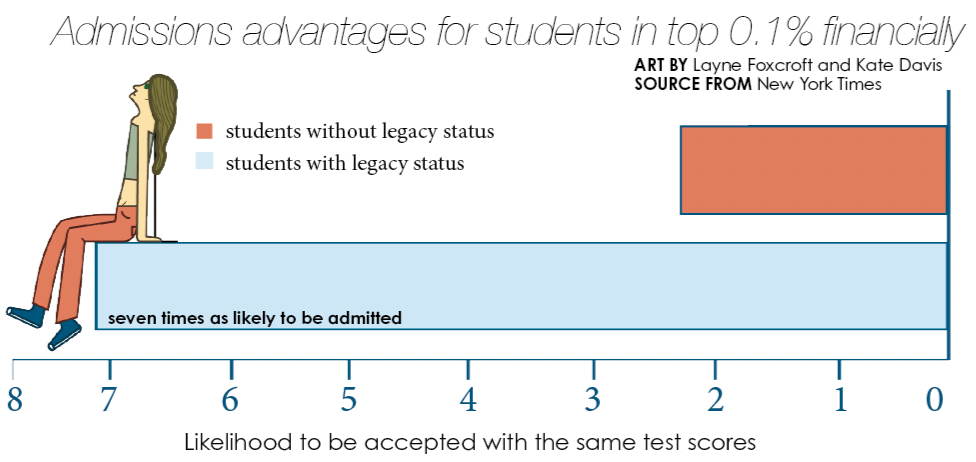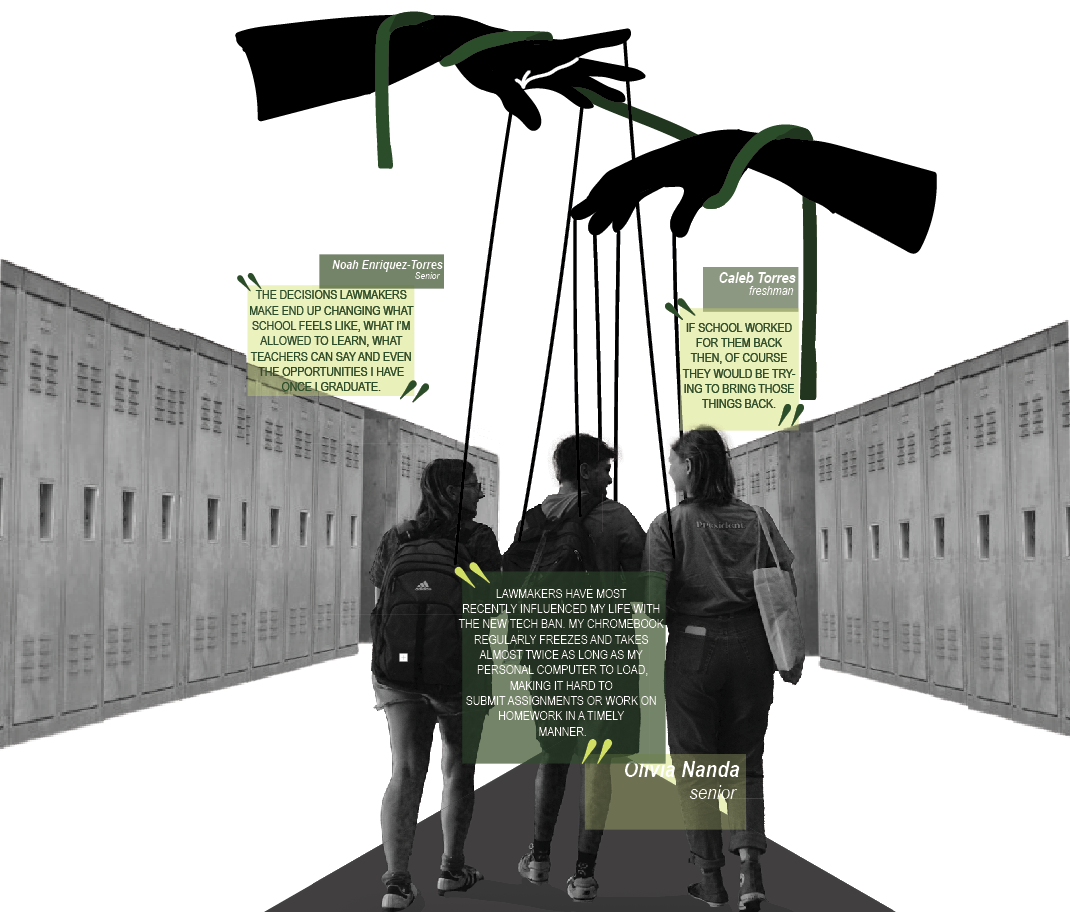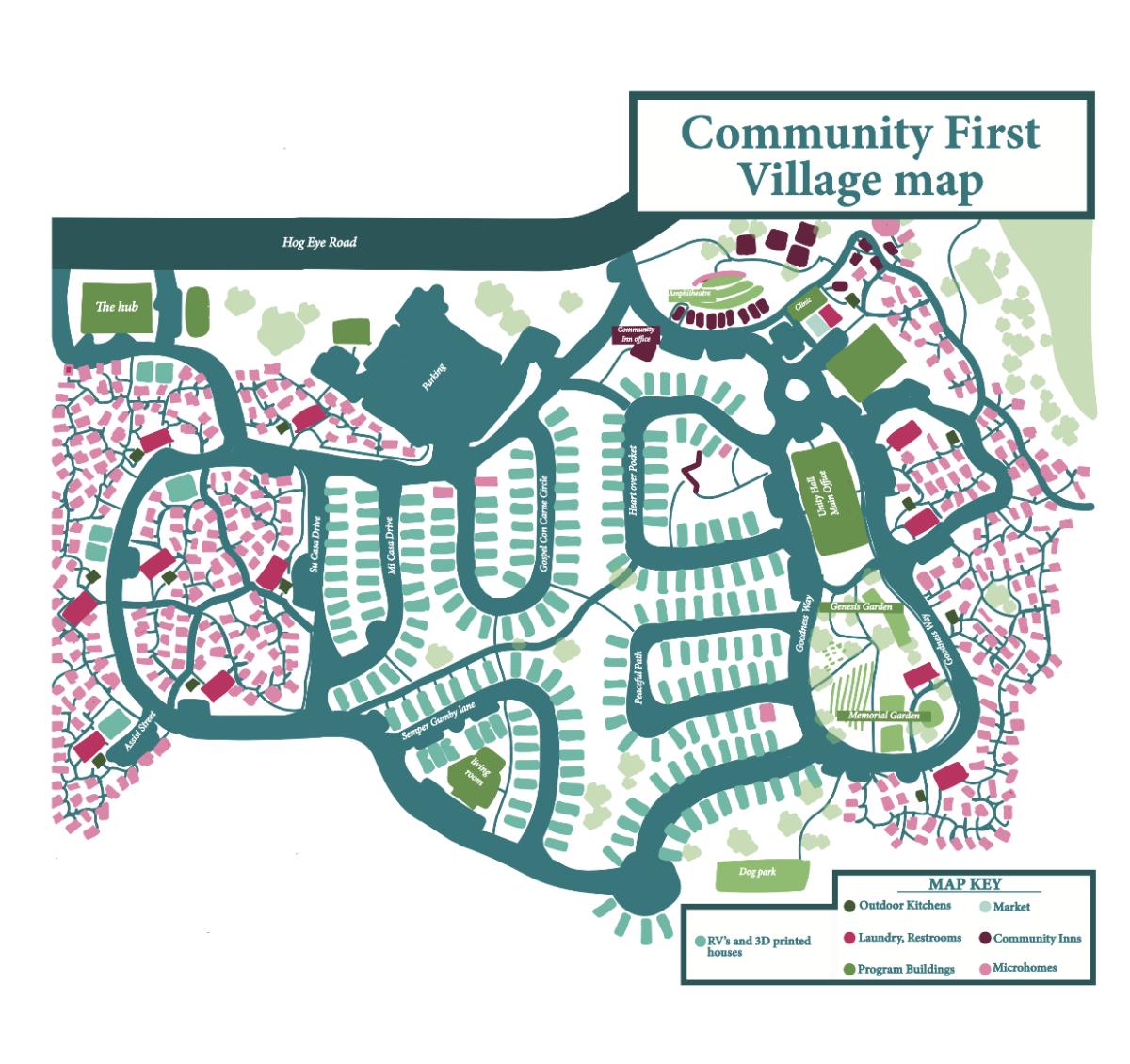
Turning the key, senior Katherine Kuster opens her mailbox door to see a letter from her dream university. Shaking with anticipation, she runs back to her house to rip the envelope open. Her eyes fall upon the first sentence: “We regret to inform you that after careful consideration we are unable to offer you admission.” Now, Kuster is left wondering what she could’ve done differently. Why wasn’t she accepted? What did someone else have that she didn’t?
Across the nation, select students qualify for “legacy status” at elite universities. This status indicates that a student’s parents, or their extended family, attended the same university. This grants the students a helpful boost in the application process. Now, students are questioning the validity of legacy status in the college admissions process.
“I would be fine if it was one consideration of many, but I think far too often, legacy status is too large of a factor in the admissions process, especially in the top-tier universities,” AP Government teacher Dalton Pool said. “It perpetuates the divide we have in America, between the haves and the have-nots, the wealthy versus the lower class. It gives an extra privilege or opportunity to people who have probably already lived a very privileged or opportunity-rich life.”
According to the New York Times, among students with families in the top 0.1% financially, those with legacy status are seven times as likely to be admitted to elite universities than those without legacy status.
“Legacy status reinforces classism. If you have a lot of wealth already, you’re guaranteeing that your children will get into the same college that you went to,” senior Chris Elwood said. “I think it’s unfair to middle-class or lower-class families who don’t have the same opportunities. It reinforces generational wealth, which isn’t fair to people who are trying to make their own wealth and opportunities.”

Elwood is among the highest-ranked students of Bowie’s 2024 graduating class. He has worked hard to ensure his position as a top student, but is aware of the effects that legacy status may have on his admissions process.
“A lot of the universities I’m applying to don’t have legacy status,” Elwood said. “But for some of my applications, it does annoy me that some people will have a better chance than me, just because their parents have given money to and attended the university before.”
Elwood is not alone in these concerns, and many students believe that there are more important factors than legacy status in the admissions process.
“Obviously your grades should be considered, but they should also consider leadership positions, if you start a club, volunteer hours, or if you’re very focused on something that’s outside of school,” Kuster said. “Schools should see that you have a passion, and you want to be able to continue that passion in college. They shouldn’t focus on your parents, because your parents aren’t you.”
In addition to the educational benefits of attending a reputable school, students who attend these universities are provided with advantages and connections after graduating. Students with legacy status are provided an automatic access to those post-secondary education benefits.
“It‘s just an extra opportunity that students from prominent families have, as compared to students who don’t have those connections, generational wealth, or those institutional relationships,” Pool said. “So, long term, it could make universities less diverse, and stifle the debates that improve the education on university campuses. That diversity is going to be hampered, and it will lead to a larger gap in society.”
With the influx of wealthy students attending Ivy Leagues, oftentimes as a result of legacy standards, the diversity between social classes at these universities has suffered.
“Parents who go to an elite university go on to make lots of money, and they might donate that money back to the school, benefiting the legacy status program,” Kuster said. “Legacy students at Ivy Leagues have parents who make lots of money, so they can afford to go to prestigious schools. For example, at Princeton I think around 60% of their students get need-based financial aid. It’s wild, especially because anyone who makes below $400,000 dollars gets need-based financial aid. So, around 40% of their student body has parents who make over half-a-million dollars per year.”
Alongside the benefits that legacy status provides for the wealthy, there are also substantial advantages given based on race. According to a study conducted by the New York Times, roughly 70% of all legacy admits to Harvard are white.
“I think that legacy programs, by nature, aren’t equitable by race, because a lot of black, indigenous, and people of color haven’t had the same generational opportunities that white people have had,” senior Charlotte Hill said. “A lot of legacy programs go back to old money in America, so it’s not at all equitable between races. I’m upset that legacy status still exists, when affirmative action was shut down; it’s so unbelievably frustrating and stupid.”
On June 29, 2023, the Supreme Court jointly ruled on two cases involving nonprofit group Students for Fair Admissions (SFFA): SFFA v. Harvard and SFFA v. University of North Carolina. Both of these cases questioned the validity of affirmative action programs at those universities. Affirmative action is the process of favoring historically marginalized groups in admissions, to address the disadvantages which result from previous discrimination.
The plaintiffs of these cases argued that the consideration of race, or the existence of racial quotas in college admissions, violated the 14th Amendment of the Constitution, which grants all US citizens equal protection under the law. The courts ruled in support of the SFFA, stating that the affirmative action programs are unconstitutional.
“If you’re following the interpretation used in SFFA v. Harvard, legacy should be hindered because it’s a very similar situation; a certain group of students are given advantages for reasons outside of their control,” Pool said. “If the Supreme Court wants to be blind to their applicants’ non-academic characteristics, and they want to be consistent, then they should shut down legacy standards.”
Following the ruling of these cases, many students now support the removal of legacy standards, in order to make university campuses as diverse and equitable as possible. However, others argue that the two programs shouldn’t be correlated.
“I feel like affirmative action was a good concept, but if schools really cared about giving back to the community and helping lower class minorities, then they would actually invest in invest in their pre-college education, rather than trying to fix it at the very end when they’re going into college,” Elwood said. “I feel like legacy status is a whole different thing. Legacy status benefits the advantaged, and affirmative action benefits the disadvantaged. If affirmative action is removed, then they should supplement it with better investment into those communities, especially if they’re going to continue legacy standards.”
According to the Washington Post, legacy status will continue to be considered at Harvard, Yale, Duke, Cornell, and several others. Conversely, there are several reputable schools who have made the decision to discontinue their legacy standards, including Carnegie Mellon University, New York University, and the Massachusetts Institute of Technology. With the possible ban of legacy standards, students are forced to consider the effects its removal would potentially have on elite universities.
“Ivy Leagues would be more equitable,” Elwood said. “The student body would be more diverse and they would have a wider variety of students. From what I’ve heard, most Ivy Leagues have lots of rich people in their own cliques. I think that the environment can be dismantled as well.”
With bans placed on affirmative action, Elwood believes the racial demographics of participating universities will likely change. While Elwood is hopeful that these changes will increase campus diversity, others are considering alternative consequences.
“I think it’s going to be really interesting to see how that affects diversity on elite campuses, especially since this is the first year that some schools are removing affirmative action,” Hill said. “I don’t think anybody can say for sure, but I think that these changes will likely make these schools more exclusive. I think it’s hard, because you can’t consider race anymore and there’s only so much that can balance those inequalities. This is a confusing and unfortunate problem that we shouldn’t have to deal with, especially if you’re not rich, white, or if you face other institutional barriers.”
In addition to the potential effects that legacy programs have on campus diversity, some believe the eradication of these programs could have consequences on the universities’ monetary gain.
“Without legacy programs, these schools will probably get less donations from influential families and alumni,” junior Simone Baskin said. “It just benefits the universities by making families pay more, so their children who might not be qualified for the school have the wealth to compensate. It’s essentially a big transaction. So, Ivy Leagues would lose a good amount of money in eradicating legacy status.”
While he didn’t qualify for legacy status when he applied to college, Pool emphasizes that legacy standards can have advantages for those who do benefit from it.
“I like the idea of family traditions and being able to go to the same university that your parents went to,” Pool said. “My dad went to the University of Texas, I went to the University of Texas, and I think that’s so powerful. I like that education can become a family tradition.”
Despite the controversy surrounding these legacy standards, many people have recognized the efforts being made by universities to diversify the student body.
“I’m not trying to hate on anyone who is benefiting from legacy status, or benefiting from the removal of affirmative action. I just honestly believe that legacy admission shouldn’t have existed in the first place,” Hill said. “That being said, I think a lot of public institutions are trying to help minority groups and provide other opportunities for people of underprivileged or underrepresented races and backgrounds.”







